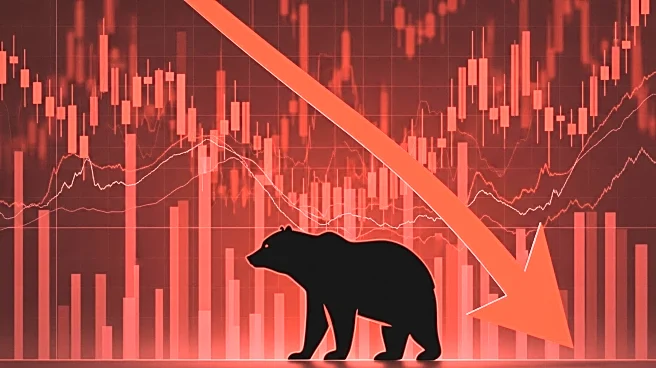What is the story about?
What's Happening?
Several major publicly traded companies, including Honeywell, American Tower, Waste Management, and Pinnacle West Capital, are approaching a technical pattern known as a 'death cross.' This pattern occurs when a stock's short-term moving average, typically over 50 days, falls below its long-term moving average, usually over 200 days. The 'death cross' is widely regarded as an indicator of potential price decline. Honeywell, an industrial giant, is nearing this bearish pattern with its 50-day moving average at $218.79 and its 200-day moving average at $218.21. This development comes as Honeywell plans to spin off its businesses into three separate publicly traded companies by the end of 2026. Despite a strong second-quarter earnings report, Honeywell shares have fallen 6.7% in the past month and are down 8% year-to-date. Other companies like American Tower and Waste Management are also close to forming a 'death cross,' indicating potential challenges ahead for these stocks.
Why It's Important?
The formation of a 'death cross' in major stocks like Honeywell and others signals potential bearish trends that could impact investor sentiment and market stability. As these companies are significant players in their respective industries, a decline in their stock prices could have broader implications for the market. Honeywell's upcoming spin-offs add uncertainty to its future performance, which may affect investor confidence. The broader market, including the S&P 500, is already under pressure due to concerns about the sustainability of the artificial intelligence trade. If these stocks experience declines, it could exacerbate existing market volatility and influence investment strategies. Investors and market analysts will be closely monitoring these developments to assess potential risks and opportunities.
What's Next?
As Honeywell and other companies approach the 'death cross,' investors may need to reassess their portfolios and consider potential adjustments. Honeywell's planned spin-offs could lead to changes in its market valuation and investor perception. The broader market may react to these technical signals, potentially leading to increased volatility. Analysts and investors will likely focus on upcoming earnings reports and strategic decisions by these companies to gauge future performance. Additionally, market participants may explore alternative investment strategies to mitigate risks associated with potential stock declines.
Beyond the Headlines
The 'death cross' phenomenon highlights the importance of technical analysis in stock market predictions. While it is a widely recognized indicator, its actual impact can vary based on broader market conditions and company-specific factors. Honeywell's strategic decision to spin off its businesses reflects a shift in corporate strategy that could influence its long-term growth prospects. Investors may need to consider both technical indicators and fundamental analysis to make informed decisions. The evolving landscape of the stock market, influenced by technological advancements and economic shifts, underscores the need for adaptive investment approaches.

















